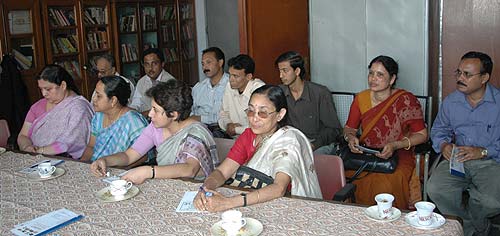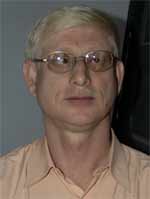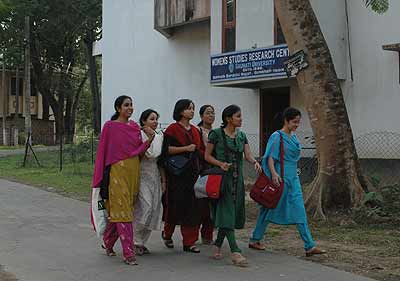SWEDISH SOUTH ASIAN STUDIES NETWORK
Meeting at the Dept. of Economics, Gauhati University, Guwahati
 Web
page: http://gu.nic.in/
Web
page: http://gu.nic.in/
Gauhati University (GU) was founded 1947 and is just like the North Bengal University in Siliguri, a medium sized university with 250 affiliated colleges and about 100 000 student at the undergraduate level. In the university campus there are about 3 000 students at the Post Graduate level and it has a faculty of 350. There are six faculties: Arts, Science, Commerce, Law, Engineering, and Medicine. It is the central university for Assam and the seven smaller states in the Northeastern part of India. Note that the university retains its name Gauhati University, even though the city today is spelt Guwahati.
 The
meeting had been organised by Prof. M.P.
Bezbaruah (photo to the right), head of the Dept. of Economics,
and was attended by about 25 scholars , most of them researchers/teachers
and PhD students in Economics. There were however also three researchers
from Political Science present. There are 20 PhD students in the Dept.
of Economics. After our presentation of SASNET and clarifications of our
aims and ways of workings, we had a discussion about the research in the
two departments and at the university at large.
The
meeting had been organised by Prof. M.P.
Bezbaruah (photo to the right), head of the Dept. of Economics,
and was attended by about 25 scholars , most of them researchers/teachers
and PhD students in Economics. There were however also three researchers
from Political Science present. There are 20 PhD students in the Dept.
of Economics. After our presentation of SASNET and clarifications of our
aims and ways of workings, we had a discussion about the research in the
two departments and at the university at large.
Laboratory of ethnic conflicts
The faculty and students at GU are very much engaged in the conditions
and problems of this region, where ethnic relations and politics quite
naturally are recurrent themes. The North-East consists of eight states,
out of which three originally were parts of Assam, namely Meghalaya, Mizoram
and Arunachal Pradesh. The other states Tripura, Manipur, Nagaland and
Sikkim have equally complex histories plagued by ethnic conflicts and
separatism ever since the formation of independent India in 1947. After
the bifurcation of Assam into several states in the 1970’s Assamese
people themselves started to mobilise for a dominant influence. This agitation
that mainly was directed against the large group of Bengali settlers in
the state (especially Bangladeshi immigrants arriving since 1971) had
a blood-stained peak around 1980. It subsided with the Assamese population
gaining a dominant hold on state politics. But it did not put an end to
ethnic conflicts in the state, which includes a large number of tribal
people (13 % of the population, belonging to 25 different groups). The
previous bifurcations, the ascendancy of the Assamese and the generally
liberalised atmosphere during the recent past have all inspired these
tribal groups, especially the Bodos, to demand more autonomy in the form
of separate homelands and in some cases even the status of statehood.
Given the smallness of these groups, the limited area they command and
their scattered settlement pattern (interspersed by other groups) these
demands are however almost impossible to satisfy. Violent agitations have
ensued and a criminality associated with this. Today, there is more violence
in the form of assault on neighbouring communities, kidnapping, and most
of all criminal acts of theft and murder than peaceful democratic mobilisation
and negotiation. Thus, this is troubled state with insecurity felt in
many locations. These issues figure high on the agenda of the research
carried out in the university.
Assam up and down and up again
 Another
important theme is the changing role and status of Assam and the North-East
within the Indian Union. During the colonial period this was in a way
a central part of the British territory with its large tea plantations
and large settler population. Tribal groups, not being controlled by Brahminical
Hindu caste hierarchies responded to the call of Christian missionaries
and converted (Meghalaya, Mizoram and Nagaland are the three states in
India in which Christians are in majority). With conversion came an early
modernity.
Another
important theme is the changing role and status of Assam and the North-East
within the Indian Union. During the colonial period this was in a way
a central part of the British territory with its large tea plantations
and large settler population. Tribal groups, not being controlled by Brahminical
Hindu caste hierarchies responded to the call of Christian missionaries
and converted (Meghalaya, Mizoram and Nagaland are the three states in
India in which Christians are in majority). With conversion came an early
modernity.
After Independence, the North-East gradually slipped into oblivion.
Through the formation of Bangladesh, the area was cut off from the rest of India when ships no more could sail on river Brahmaputra all the way up to Dibrugarh in Upper Assam. Eventually the railway and road links were also disrupted, and transports to and from Assam and the other northeastern states became an expensive and time-consuming affair. In spite of being India’s main producer of tea, oil and gas Assam is almost a forgotten part of the country.
Today the situation is again turning and the North-East is becoming
a hot spot in India. The anticipated large land based trade with China
will go through these states. Cross-border trade and regional political
relations also with the other neighbouring countries of Nepal, Bhutan
and Myanmar is, therefore, important issues for research at the university.
One needs only to take a trip on the so called highway passing on the
other side of the river. The traffic jam at rush hour is undescribable
and almost intolerable.
Other topics that figure high on the research list are, for example, economic development of Assam (agriculture, tea, and forest products); institutions and governance; demographic change; and environmental problems.
 After
the meeting, we took a stroll through the nice green campus of the university.
We found that there is Centre for Women’s Studies (photo to
the right). Unfortunately, none from that department had come to
our meeting.
After
the meeting, we took a stroll through the nice green campus of the university.
We found that there is Centre for Women’s Studies (photo to
the right). Unfortunately, none from that department had come to
our meeting.
Researchers we interacted with during the meeting:
• Prof. M.P. Bezebaruah
• Prof. Srinath Baruah, Mathematical
economics and econometrics
• Prof. Runumi Dowerah Baruah
• Prof. K.K. Burman
• Nani Gopal Mahanta, senior
lecturer in Political science, and Co-ordinator, Peace and Conflict Resolution
• Dr. Dhruba Pratin Sharma,
lecturer, Political Science, GU
• Dr. Sakiya Khan
• Dr. Nissar Ahmed Baruah
• Soi Jitu Jamuli, Research
Associate
• Sri Sadananda Nath,
Research scholar
• M.R. Kasi, research
associate, OKDISCD
• Pradyut Guha, guest lecturer in Economics,
Kokrajhare Campus, GU
• Geetali Sarma, senior lecturer in
Economics, Tangla College, Dist. Darrang, Assam
• Abdul Haque Ahmed, senior lecturer
in Economics, Bikali College, Dhupdhera, Dt. Goalpara, Assam
• Prof. Archana Sharma
• Ms. Indira Baruah
• Dr. Gayathi Goswami
SASNET - Swedish South Asian Studies Network/Lund
University
Address: Scheelevägen 15 D, SE-223 70 Lund, Sweden
Phone: +46 46 222 73 40
Webmaster: Lars Eklund
Last updated
2010-03-01
